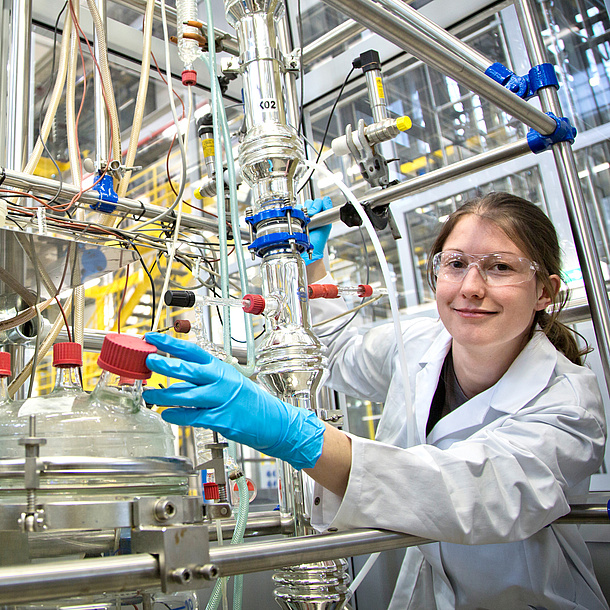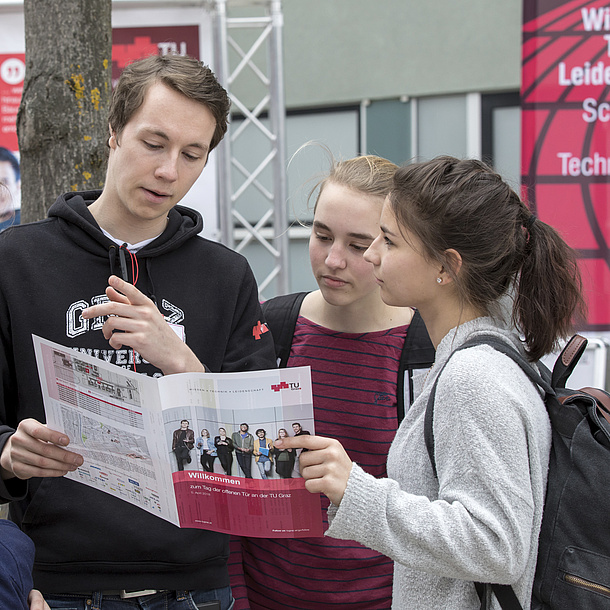Quick Facts
- Duration of study: 6 semesters
- ECTS credit points: 180
- Academic degree: Bachelor of Science (BSc)
- Language of instruction: German,
some courses in English.
The Bachelor's Programme
In the Bachelor's Degree Programme Chemical and Process Engineering, you will learn about all the technological and industrial processes and material conversion steps that can be used to create a product from a raw material. This raw material can be wood from which pulp and later paper or viscose are produced, but can also be waste water from which, for example, environmentally harmful substances are removed.
In this degree programme, you will receive a broad, basic education in the natural sciences and engineering and specifically in the fields of mathematics, physics, chemistry, mechanical engineering, and electrical engineering. In addition, you will become familiar with basic chemical and process engineering operations. These basic operations include conversion steps that take place in mechanical, thermal, or chemical processes. You will learn how to describe, develop, and simulate these processes so that they can be implemented economically and sustainably on an industrial scale.
In addition to the good study environment, students have access to excellent laboratory and technical infrastructure at the chemical and process engineering institutes. This infrastructure enables you to become familiar with process engineering processes from the laboratory scale to the pilot scale.
In order to create a connection between your basic academic education and industrial applications from the very beginning, contact with the professional world is intensively supported during the degree programme. Excursions to well-known industrial companies are held, company lectures and conferences are organised, industrial processes are developed on the basis of plans from existing production plants, or bachelor’s projects are offered in the context of industrial research projects (e.g. the coating process used in the production of computer chips).
Studying Chemical and Process Engineering
Focus Areas
You learn more in the following compulsory subjects:
Fundamentals of Chemical and Process Engineering: You will solve problems using material (mass) balance equations and approaches and get an initial introduction to basic process engineering operations.
Mathematics 1 and 2: You will gain a thorough introduction to engineering mathematics and learn how to apply this knowledge. You will be able to create significant probability models from observations and measurements.
Fundamentals of the Natural Sciences: You will learn the basics of physics for engineers, the most important chemical laws, and chemical working and analytical techniques.
Introduction to Mechanical Engineering: You will create technical drawings and learn how to roughly plan manufacturing processes such as forming, separation, and joining.
Mechanics: You can describe single-phase and multi-phase systems using tools for continuum mechanics. You will learn about models and related solutions for vibration and shock processes, which are associated with industrial transformation processes.
Basic Education in Mechanical Engineering: You can describe and correctly scale the most important machine elements and learn how to categorise materials and select the most appropriate ones. In addition, you will learn to use 3D-CAD software and create project plans.
Thermodynamics: You will deepen your knowledge of technical thermodynamics and learn how to solve industrial problems by applying the methods learned.
Fluid Mechanics and Heat Transfer: You will learn about, for example, frictionless flows, hydro- and aerostatics, heat transfer, and heat conduction.
Mass Transfer: You will learn about mass transfer processes and learn how to plan, carry out, and interpret the results of experiments to determine the design parameters for mass transfer processes.
Introduction to Areas of Specialisation: You explore the world of biotechnology and learn the fundamentals of organic chemistry. For example, you will become familiar with paper and fibre production processes, including all material flows.
Electrical Engineering and Programming: You will receive a basic introduction to electrical engineering, measurement technology, electronics, as well as switching, control, and regulation technology. You will become familiar with programming basics and learn how to use the Matlab software package.
Chemical Thermodynamics: You will learn how to use various methods to calculate material properties and determine phase and reaction equilibria. You will be able to use basic methods to develop thermodynamic models.
Reaction Technology and Thermal Separation Processes: You will learn more about material (mass) and energy balances for various applications and learn how to calculate thermal separation processes, such as distillation, extraction, or drying, and design the necessary apparatus.
Process Engineering: You will learn how to design plant components and equipment, create flow diagrams for the introduction of various conversion processes, and economically evaluate plants or individual components.
Mechanical Chemical and Process Engineering: You learn more about specific subject areas, such as particle characterisation and sampling, as well as explore processes and apparatus used for particle separation with gases or liquids and for the comminution or agglomeration of particles.
Study counselling: Check what you expect!
What will I have to do in the first semesters? How much practice can I expect? And what can I actually do with my degree when I've finished? Check what you expect!
A student and a lecturer will take time for all your questions and you will get to know TU Graz during on-site appointments. Up to 10 persons can participate at each date.
Contact: lse@tugraz.at

What excites me most about my degree programme is that I can acquire fundamental knowledge in many areas ‒ from mathematics to mechanical engineering and natural sciences (especially chemistry) to electrical engineering and even the basics of programming. For me, Chemical and Process Engineering is the “all-rounder” among the engineering sciences.
Chemical and Process Engineering in Research and Industry
Chemical and process engineers develop key technologies that support the production of almost all industrial products, the reduction of emissions, the use of renewable raw materials, the reduction of environmental pollution, and the patient-centred production of medicines.
In the area of research, for example, new simulation methods are being developed to describe a wide variety of production processes, such as the manufacture of computer chips, bio-based fuels, or medicines. Research is also being carried out to find new catalysts for fuel cells, reduce the amount of chemicals and energy used in production processes, and recycle CO2 from combustion processes. Other research topics include the use of artificial intelligence to describe processes and digitalisation in chemical and process engineering.
From an economic point of view, chemical and process engineering has applications in practically all branches of industry, ranging from the production of food, medicines, and chemicals to the production of fuels, pulp and paper, and fuel cells. In the field of environmental technologies, for example, chemical and process engineering plays an important role in waste water and exhaust air treatment or in waste separation processes. It is also used in the recycling of bioresources, such as wood or agricultural residues. The provision of clean air (i.e. air free of particles and pollutants) is needed for the production of, e.g. sterile medications or needed in biosafety laboratories. This would not be possible without chemical and process engineering.
Admission
Admission Requirements
Requirements for admission to a bachelor's degree programme at TU Graz
Admission Deadlines
Summer semester 2025
Admission period: 7 January to 5 February 2025
Winter semester 2025/26
Admission period: 7 July to 5 September 2025
Admission Procedure
Supplementary examination
If you are required to take the supplementary examination "Descriptive Geometry" when you are admitted to the Chemical and Process Engineering programme, you can take it during the bachelor's programme.
Questions about admission?
Contact study@tugraz.at
Perspectives for Graduates
Professional Fields
Graduates of this bachelor’s degree programme are qualified to apply for the Master’s Degree Programme Chemical and Process Engineering or can begin their career directly after receiving their academic degree.
If you enjoy working in the manufacturing industries environment, appreciate being given diverse tasks, and like to work internationally, the field of chemical and process engineering has an interesting and broad scope of activities and excellent career prospects to offer.
Chemical and process engineers
- work in plant construction in research and development, design and planning, as well as plant commissioning and maintenance;
- are responsible for ensuring the functionality and quality of systems and products during system operation;
- are active in research and development in the chemical industry, pulp and paper industry, pharmaceutical industry, or food industry;
- carry out process development for the use of renewable raw materials;
- optimise running processes in companies; or
- work in project management, with public authorities or in environmental protection or in the field of energy and environmental technology.
Advanced Master’s Degree Programmes
After completing the bachelor's degree programme, you can enrol in the following master’s degree programmes without further requirements:
Information on other master's degree programmes with requirements you can find on the respective pages for the master’s degree programmes.
In addition, the bachelor's degree offers you the opportunity to apply internationally for master's degree programmes.

What fascinates me about process and chemical engineering is that it allows you to understand the individual processes that happen in a chemical plant and to calculate or simulate them. I find the broad, basic engineering education offered in the bachelor's degree programme very exciting when it’s combined with diversity of practical subjects. The programme offers diverse career possibilities after graduation.




